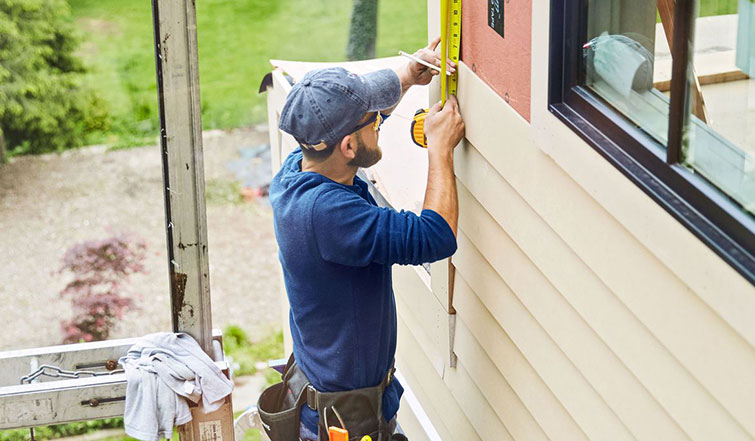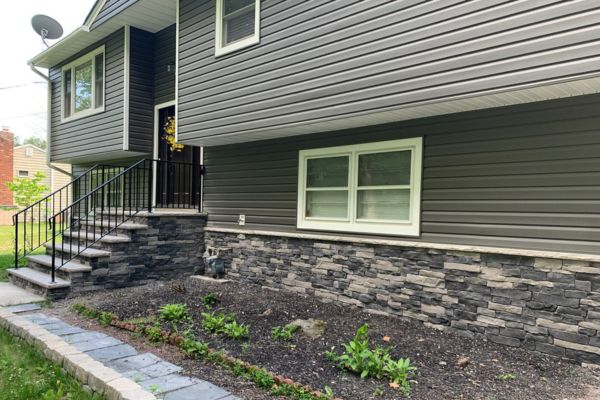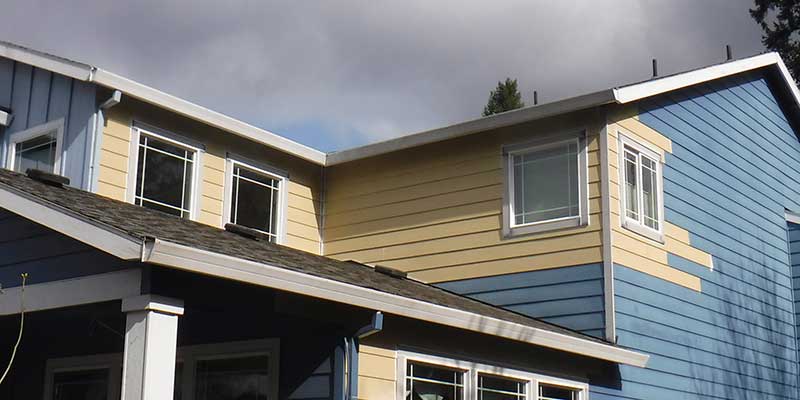The Vital Overview to the Numerous Types of Exterior Siding and Their Unique Benefits
In the realm of home enhancement, selecting the appropriate home siding is an important decision that influences both aesthetic allure and useful efficiency. The selection of materials readily available, such as timber, plastic, fiber cement, block, and metal, each deal distinct benefits that deal with various needs and choices. Comprehending these differences can considerably enhance the durability and value of a home - morris siding contractor. Nevertheless, with many alternatives to think about, which house siding material genuinely stands apart for your particular task? Exploring these options can result in informed choices that straighten with both design and functionality.
Timber Exterior Siding
Timber home siding, a prominent choice for property exteriors, provides a timeless aesthetic that incorporates natural appeal with architectural stability. This house siding material is offered in various designs, including clapboard, shingles, and board-and-batten, permitting property owners to personalize their façade to match their design preferences. Wood siding is commonly crafted from resilient species such as cedar, redwood, or pine, which are known for their durability and capacity to stand up to ecological stressors.
One of the main advantages of timber house siding is its outstanding insulation residential properties, which can contribute to power efficiency and lower home heating expenses. In addition, wood exterior siding is naturally degradable, making it an environmentally friendly option when sourced sustainably. Routine upkeep, consisting of paint or staining, can extend its life expectancy and boost its look, permitting home owners to protect the all-natural charm of the wood.
However, possible drawbacks consist of sensitivity to parasites, rot, and weather damages, demanding appropriate therapy and maintenance - morris siding contractor. In spite of these issues, when properly taken care of, timber siding can offer a long lasting and gorgeous option that enhances the personality of a home while using a cozy, inviting environment

Vinyl Siding
Plastic home siding has actually become a leading choice for house owners looking for a low-maintenance outside option that incorporates sturdiness and cost. This versatile material is crafted from polyvinyl chloride (PVC), making it immune to different climate conditions, consisting of moisture and UV rays. Because of this, plastic exterior siding does not warp, rot, or discolor, making certain resilient aesthetic charm.
Among the main advantages of plastic exterior siding is its considerable variety of colors and styles, allowing property owners to achieve the wanted appearance for their residential property without the requirement for frequent repainting. In addition, vinyl exterior siding is very easy to mount, which can substantially lower labor prices during building and construction or remodelling projects.
Plastic house siding additionally adds to power performance. Several choices feature insulation backing, which boosts thermal efficiency, aiding to maintain comfy interior temperatures and possibly reducing energy expenses. Moreover, its smooth surface area promotes very easy cleansing, requiring only routine washing with a yard hose to remove dust and debris.
Fiber Concrete Exterior Siding
Fiber concrete home siding has actually gained traction among house owners and home builders alike due to its remarkable mix of sturdiness and visual versatility. Composed of a mix of cement, sand, and cellulose fibers, this home siding choice is crafted to endure extreme weather condition problems, including high winds, hefty rainfall, and temperature changes, making it a lasting option for household exteriors.

One of the main advantages of fiber cement siding is its resistance to parasites, such as termites, and its non-combustible nature, offering improved fire safety. morris siding contractor. In a knockout post addition, it is available in a wide variety of colors, designs, and textures, allowing property owners to achieve their wanted visual without sacrificing efficiency
One more benefit is its reduced maintenance requirements; fiber concrete home siding usually calls for painting or staining every 5-10 years, which is less constant than various other materials. Moreover, its long life adds to a lower general expense of possession, as it reduces the requirement for regular fixings or substitutes.
Inevitably, fiber concrete siding represents an outstanding investment for those looking for a durable, attractive, and functional outside alternative, incorporating both form and function to enhance the home's visual charm.
Metal Home Siding
The attraction of steel house siding exists in its durable resilience and contemporary visual allure, making it a popular selection for modern architecture. Offered in products such as light read this article weight aluminum and steel, steel siding offers a range of finishes and colors, allowing homeowners to attain a personalized appearance that enhances their style vision.

Power performance is another significant advantage, as numerous steel siding products are developed with insulation choices that aid control interior temperatures. This can lead to minimized energy costs gradually. Furthermore, metal exterior siding is typically recyclable, making it an eco pleasant selection for sustainability-minded home owners.
The setup process for metal home siding can be relatively simple, resulting in a quicker turnaround time for construction projects. Overall, steel home siding integrates functionality and style, making it a practical alternative for those looking for a enduring and visually enticing exterior finish.
Block and Rock Exterior Siding
Brick and rock home siding stands apart as a timeless option that enhances the visual appeal of any home. Recognized for their longevity and low maintenance, these products offer an outstanding roi while elevating the residential or commercial property's aesthetic charm. Available in numerous colors, appearances, and patterns, brick and rock can be tailored to match diverse building styles, from standard to modern.
Among the primary advantages of block and rock exterior siding is their power performance. Both materials have all-natural insulating buildings that help control interior temperature levels, potentially minimizing home heating and cooling expenses. Furthermore, they supply exceptional fire resistance contrasted to various other siding alternatives, adding to improved safety and security.
One more advantage is their longevity. Brick and rock can last for decades, commonly needing marginal upkeep past periodic cleaning. Unlike timber exterior siding, they are resistant to bugs and rot, guaranteeing a long-lasting exterior that withstands the elements.
Verdict
In summary, the selection of siding significantly influences a home's visual charm, energy performance, and upkeep requirements. Each kind of exterior siding-- whether timber, plastic, fiber metal, block, or cement and rock-- uses distinct benefits customized to different homeowner preferences and ecological conditions.
One of the primary advantages of timber home siding is its outstanding insulation homes, which can contribute to energy efficiency and lower home heating costs. Additionally, timber exterior siding is eco-friendly, making it an eco pleasant alternative when sourced sustainably.One of the main benefits of steel exterior siding is its resistance to various environmental helpful resources factors.Power effectiveness is one more significant benefit, as lots of metal siding products are developed with insulation alternatives that help manage indoor temperatures. Each kind of house siding-- whether wood, vinyl, fiber steel, cement, or block and rock-- uses special advantages tailored to different homeowner choices and environmental problems.